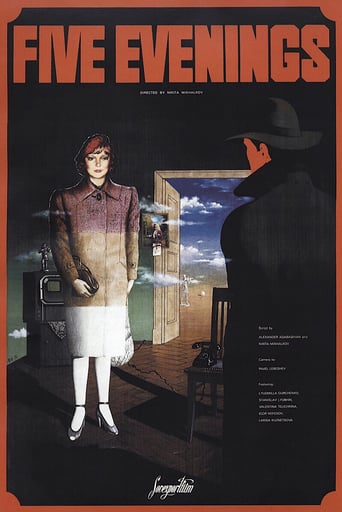Baceseras
Not many films by Nikita Mikhalkov have made it to U.S. screens, and most of those that have leave no lasting impression – leisurely paced costume dramas muffled up in pretty scenery, pretty people; the kind of movies you can watch with your eyes closed, as the music cues you to remember other similar movies, and the too-familiar sequence of emotions. But that's less than half of Mikhalkov's output, the export quarter. Who knows but there may be treasures to find in the unseen territory of Mikhalkov's oeuvre? There's at least one treasure, and if it stands alone, it stands as a solitary masterpiece."Five Evenings" takes place in Moscow in 1958, during the Khruschev "thaw," when (some) Russians were able to experience a version of the Western-style delights of pop-culture and pop consumer goods – little sweeteners of the daily grind, "fleeting" pleasures because ultimately worthless, but sweet nonetheless; for once they were able to enjoy these without (too much) soviet moralizing about Western decadence. (It eventually turned out that the soviet moralizers hadn't vanished, they were only drawing breath – and learning new tricks.) The historical interval of the thaw is only casually related to the action of "Five Evenings," but the joyous touches that sketch in the period help to give the film an extra depth of interest and charm.The central character, Sasha – Aleksandr Petrovich Iliyin – is a non-conformist, which implies nothing zany or counter-cultural as it might in a Hollywood story. Staying true to himself hasn't given him a free hand and a wide scope for activity; on the contrary, every free choice he has made has narrowed the way open ahead of him, and his stubborn pride at going on must be his satisfaction. His eyes, when they aren't hooded, are watchful and full of humor. He brings Russian soul music into the movie when he decides to stir the ashes of an old love, to see if there's still a spark left in there.His former lover, Tamara, as curator of the ashes, has grown severe; a mask of disappointment seems to have taken over her personality. But she isn't stupid, and if she's a killjoy she doesn't want to be. After she crushes the spontaneity of a moment, the awareness of her blunder strikes her right away; she tries to fix things by being deliberately spontaneous, and the impossibility of getting any traction that way is both funny and painfully recognizable.Iliyin carries his myth and mystery with him, along with a hint of danger. For that and other reasons, "Five Evenings" can claim kin with "Choose Me." If you liked Alan Rudolph's film, this dark-bordered Valentine may be just for you.
Maciej Piotrowski
Watching the latest movies of that director is not a very pleasant experience. The experience is even worse, if you had seen his earlier work. I doubt many people did though, and I would like to encourage everyone to try to see this movie.It is a deeply engaging drama - a story of love that got broken by the history but gets another chance. After all these years passed, however, the question is, are the people even capable to try for something that would change their whole life? Leading roles are acted superbly (supporting kids have their worse and better moments), the story is told in an extremely tight manner and the final master shot is simply breathtaking, and perfectly rounds up the meaning of this movie. It is a showcase of an incredible talent. Whatever happened to Nikita after he made "The Sunburnt"?
St0nE_heEad
I stayed once late to watch this film on TV. I've never seen anything by Mihalkov and I didn't know what to expect, but I am only glad that I saw Five Evenings. It's a thorough study of a two characters and how they respond to the conditions they live in. They eventually fall in love but after a lot of doubt, uncertainty and lack of feelings. They want to live a happier life, but are not sure how to achieve it. In a broad sense I thought it aimed at presenting the state of the Russian people(and of any other people for that matter) after the Second World War. Mihalkov made me experience the discouragement and the loss of faith in good that these people felt. I have to note that the actors were simply flawless and it was through their acting that the film was able to breathe and fascinate. And the ending was simply beautiful. Most of the film was black and white, but in the last few minutes, we see wonderful colour details from inside an apartment, as if the whole film, together with the characters overcame the alienation and lack of feeling. Very much recommended! I can't wait to see something else by Mihalkov.
Evgueni Klebanov
Simple at first sight and entertaining story. Characters are shown very well: actors are very convincing and you can see the change of people over very limited time. Everybody is "good". Conflict arising between different understanding of the meaning of being "good": should you follow your way only or should try to adjust to others. Is this question important in comparison with love? I would definitely try to see it again: to understand better.



